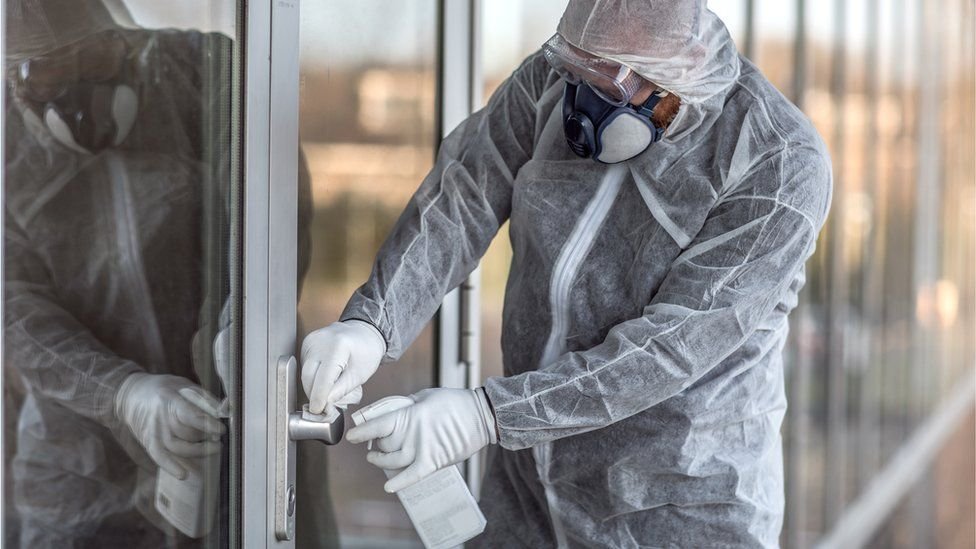Concerns have been raised about employees forced to go into workplaces that are not Covid-compliant during lockdown.
Between 6 and 14 January, the Health and Safety Executive (HSE) received 2,945 complaints about safety issues.
The head of the UK's unions called for ministers to crack down on employers "who break Covid safety rules".
The HSE said it had scaled up its work to check and support firms during the pandemic.
The Observer reports that no companies have been prosecuted and fined for breaking workplace coronavirus safety rules since the start of the latest national lockdown in England, although a spokeswoman for the HSE said figures on enforcement action, which can include verbal advice or a written warning, cannot be verified until Monday.
She added that its inspectors "continue to be out and about, putting employers on the spot and checking that they are complying with health and safety law".
The HSE has introduced telephone spot-checks in response to the coronavirus crisis, she said.
"We continue to scale up the number of spot check calls and visits we are doing so we can reach as many businesses as possible during the current lockdown period."
TUC general secretary Frances O'Grady said: "If the government is upping enforcement, ministers should start with employers who break Covid safety rules."
She also called for an increase in resources for the HSE "to stop rogue employers getting away with putting staff at risk. Every employer needs to know an inspection could happen any time".
The HSE has carried out more than 32,300 site visits during the pandemic.
The government should also make it clear that everyone who can work from home should do so, Ms O'Grady added.
What are the rules on going to work?
Under current lockdown restrictions, people across the UK who can work effectively from home should do so. They should only travel to their workplace if they cannot do their job remotely.
This includes healthcare professionals, teachers, childcare providers, transport workers, people who work in construction or manufacturing, funeral directors, and essential retail workers.
For workplaces that remain open in England, employers must "carry out an appropriate Covid-19 risk assessment" to develop a "specific" strategy to stop the virus's spread.
In England, guidelines set out strict measures which employers must follow, such as minimising the number of unnecessary visits to the office, frequent cleaning of workspaces and ensuring that staff observe 2m (6ft) social distancing wherever possible.
There is similar guidance for employers across a range of sectors in Scotland, Wales and Northern Ireland.
A spokesperson for the government said: "The law is clear that people can only leave the home to work if they cannot reasonably work from home.
"We have worked with trade unions, businesses and medical experts to produce comprehensive Covid-secure guidance so that businesses permitted to remain open can do so in a way that is as safe as possible for workers and customers. This is kept under review as our understanding of the virus develops."
A recent survey conducted by the Royal Society for Arts, Manufactures and Commerce (RSA) also suggests that some staff have faced pressure to return to the workplace despite a recent positive coronavirus test.
Of 1,172 UK workers surveyed, four in 10 said they had worked within 10 days of a positive result.
More than 10% of respondents also said they had been ordered on-site when they could have "easily" and "safely" worked from home.
'It's really demoralising'

Brian (not his real name), works cleaning portable toilets on construction sites in south-east England.
He told BBC Radio 5 Live that he does not feel safe, but feels "forced to carry on working so I can pay my bills".
On the site he works at most of the time, he hasn't seen a "vast amount of mask-wearing" and says that he has been laughed at for wearing his face mask and visor.
"It's really demoralising because you're laughed at anyway because of the job you're in."
He says the situation is "50% worse" than when construction sites were closed during England's first national lockdown.
Due to his and his wife's worries, he asked if he could be furloughed, but his firm said that he would only be eligible for Statutory Sick Pay.
"Morale is on the floor," he says.
Alan Lockey, head of the RSA's future work programme, suggested that workers "feel forced to put themselves and others at risk of the virus" because of insecure work and pressure from bosses.
He also called on Chancellor Rishi Sunak to end the "trade-off between health and putting food on the table" by allowing self-isolating workers to access the government's furlough scheme and maintaining the £20-per-week uplift in universal credit, which is due to expire in April.















